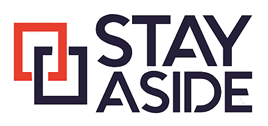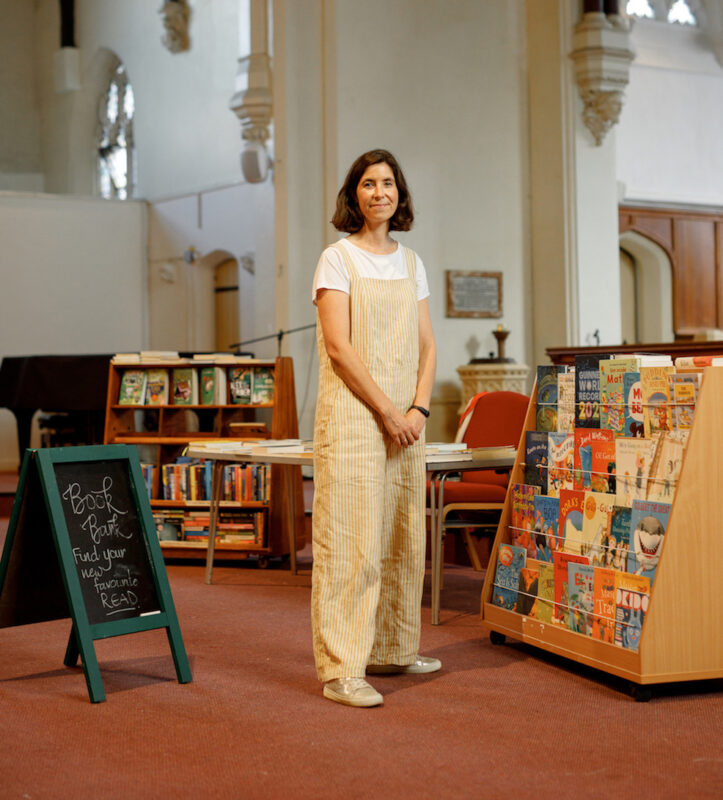A new charity is joining forces with Britain’s food banks, serving up books to browse, borrow or keep
They can turn a dull commute into a fight of fantasy, help foster friendship or deepen the bond between parent and child. Books pack an undeniably mighty transformative punch, one that is bringing a positive plot twist to a narrative more commonly associated with hardship.
Bookbanks is a new charity founded by London-based writer Emily Rhodes, who hit on the idea of gifting books to guests at her local food bank. Now, after a tentative start, she’s aiming to nourish community connection and feed conversations by branching out across the UK. “Books for me have been a signpost to think for myself and give me the impunity to imagine, and to face my inner anger and fear,” says David, one of the people to have made use of the service so far. “But also, they give me a hope, and an understanding that I’m not alone.”
Rhodes has been immersed in books all her life. Reading avidly as a child, she went on to study English at university and worked in publishing and bookselling before breaking into journalism. She set up Emily’s Walking Book Club over a decade ago, and still runs the monthly meetup on Hampstead Heath in London, as well as freelancing as a book critic for the likes of The Guardian and The Spectator.
Two years ago, she began volunteering at a food hub organised by her local community action group in Newington Green, north-east London. “I was very aware of books being this powerful tool, and maybe having unexpected uses and unexpected consequences,” she says.
“People think of a book as a very solitary thing which you go and buy, then sit down and read, but I think there’s another side to books that makes them amazing connectors and community builders. One of the great joys of bookshops and libraries is that they’re spaces to browse, spaces to chat, and I really wanted to bring that to the food bank. Nobody should have to choose whether to ‘feed or read’.”
Starting out with a trestle table laden with a few hundred donated tomes, Rhodes says the effect was extraordinary. “Everybody flocked to the table, people were picking up books and browsing. There was an instant conversation that began with books and went into other places very fast. On that first day there were 35 guests accessing the food bank, and I gave out 50 books.”

‘People think of a book as a solitary thing, but I think there’s another side to books that makes them amazing connectors and community builders’ – Bookbanks founder Emily Rhodes
The concept’s success, however, is measured in more than just numbers. It’s also, says Rhodes, about recasting a food bank visit as a positive experience instead of a difficult, or even potentially humiliating, chore. “Food banks feel transactional. There’s a big sense of shame, people are often at a very low ebb and there’s a lot of waiting,” Rhodes explains. “Bookbanks change the balance of how people think about that space and turn it into something much more hopeful and inspiring.”
Testimonials from users speak volumes. “I take books home to read with my son. It’s the best time; we are quiet together,” says Yusuf. “If you haven’t got money, but you have a book, the book is knowledge and knowledge is good.”
Some may be quick to point out that public libraries already do a fine job of lending for free, but social exclusion and homelessness can throw up barriers to library access, and Rhodes points out that a Bookbanks book is owned rather than borrowed.“That empowers you to give that book on,” she says. “Usually when you come to a food bank, you’re taking, and that’s what can feel so grim. But now you’re actually able to give.”
Books have given me the impunity to imagine, to face my inner anger and fear. Also, they give me an understanding that I’m not alone
As Neil Griffths, Bookbanks chair and founder of the Republic of Consciousness Prize for Small Presses award, points out: “The one demographic publishing has always failed to reach is the financially disadvantaged. Bookbanks provides this essential access.”
With support from ambassadors including author Andrew O’Hagan and writer Elizabeth Day, Rhodes launched Bookbanks as a charity in June, relying on grants and donors to fund a training programme for volunteers. They come from book industry backgrounds as writers, librarians, agents or publishers, and besides learning the nuts and bolts of displaying, storing and managing their stock of donated books, they’re coached in safeguarding, conversation-starting and active listening.
Fellow Bookbanks director Hattie Garlick opened an outpost in Wymondham, Norfolk, the same month. A second in the county is slated for November, along with a site at Hammersmith and Fulham food bank in London, but Rhodes needs more funding to realise the charity’s potential. She’s been deluged with emails from people across the UK who are eager to repeat the model.
In the meantime, the pair plan to run more author events after their inaugural talk, featuring writer Nadia Kabir Barb. And the next chapter may prove to be the biggest thriller yet: the charity has begun rolling out writing workshops, with the first taking place last month at the Newington Green and Wymondham sites. They featured Damien Mosley, author and founder of the independent publisher and social enterprise Indie Novella, who shared writing tips and experiences with those gathered.
“It seems like the next step from reading is writing,” offers Rhodes.“People have such big stories to tell, and I think writing about them would be very empowering, fascinating and brilliant. The next great book could just be waiting to be written here: wouldn’t that be amazing?”
Photography: Sam Bush
-
2,750
books have so far been given away by Bookbanks
-
2022
The first service opened at the Newington Green food bank in north-east London
-
36
%of parents struggling with the cost of living are buying fewer books for their children
Be part of the solution
Positive News is helping more people than ever to get a balanced and uplifting view of the world. While doom and gloom dominates other news outlets, our solutions journalism exists to support your wellbeing and empower you to make a difference towards a better future.
But our reporting has a cost and, as an independent, not-for-profit media organisation, we rely on the financial backing of our readers. If you value what we do and can afford to, please get behind our team with a regular or one-off contribution.
Give once from just £1, or join 1,500+ others who contribute an average of £3 or more per month. You’ll be directly funding the production and sharing of our stories – helping our solutions journalism to benefit many more people.
Join our community today, and together, we’ll change the news for good.


